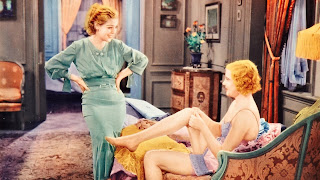It's unfortunate that this effort at filmmaking is not really successful. It has a decent premise, and a number of good actors, but nothing really gels. It's not that the movie is bad - it has some good moments and presentable performances, but in the long run, the film sinks because of a poorly designed script.
Jane Russell does her best with what she's given. Laurel is a strong woman, who sees her career as the most important thing in her life. She's smart and she is determined, so it is hard to understand why she would fall for someone like Mike Valla (Ralph Meeker). He strikes her, and he has forcibly removed her from her home. Part of the problem is that the years have made some aspects of the film distasteful - Laurel is hit a several times; when she hits back, it's set up as being amusing. Quite honestly, there is nothing amusing about her predicament.
None of our group are particular fans of Ralph Meeker, and we didn't find that there was any chemistry between him and Ms. Russell. He's not bad, but he is much more convincing in menacing mode (like in Jeopardy) than in as the romantic lead. Ms. Russell very much wanted Dean Martin to appear as Mike, but director Norman Taurog selected Mr. Meeker after Ray Danton was released from the film (Flashes from Filmland, January 12, 1957 by Erskine Johnson) - it was decided that Mr. Danton looked much too young to be romancing Ms. Russell.
The interactions between Laurel and Mike's best friend Dandy (Keenan Wynn) are far more engaging. There seems to be real affection between the two, and Dandy is a more likeable character than Mike. The son and grandson of actors (Ed Wynn and Frank Keenan, respectively), Mr. Wynn spent his film career as a second banana, with a body of work in some outstanding films: The Hucksters (1947), B.F.'s Daughter (1948), Annie Get Your Gun (1950), and Dr. Strangelove (1964) are just a few examples. He'd started on Broadway (he appeared in 9 plays between 1935 and 1943); worked in radio, and eventually segued into television - he took over the role of Digger Barnes in Dallas when David Wayne's other commitments forced him to leave the role. Mr. Wynn was married three times. His first marriage, to Evie Lynn Abbott ended in divorce (the next day Ms. Abbott married Mr. Wynn's best friend, Van Johnson. She would later state that she was forced to marry Mr. Johnson to protect Mr. Wynn's career (The Independent)). His third marriage to Sharley Hudson lasted from 1954 until his death of pancreatic cancer in 1986.
There are some other good character actors in the cast, who make the most of what screen-time they have. Fred Clark (Sgt. Ed McBride) is convincing as a police officer trying to make amends to Mike Valla for wrongly imprisoning him. Una Merkel (Bertha) gives a nice turn as Laurel's assistant, confidant, and best friend. Adolphe Menjou (Arthur Martin), however, is quite over-the-top as the studio head.
Ms. Russell and her husband Bob Waterfield purchased the novel on which the script is based for Russ-Field, their production company (AFI catalog). The novel by Sylvia Tate was based on the alleged kidnapping of actress Marie McDonald (TCM article). Though Ms. MacDonald was found battered on a desert road in California, police and her ex-husband Harry Karl (who would later marry Debbie Reynolds and ruin her financially) believed the kidnapping was faked to garner Ms. MacDonald some publicity (Pulp International). The truth of the story was never proved or disproved.
The New York Times review was dismissive, and we have to agree with it. Even at 87 minutes the film seems long. It's not a bad film, it just is a very mixed-up one. It seems like the writers wanted to write a romance, but then decided it should be a comedy - neither holds for very long. You wait for hi-jinx you never get; or for a real romance that never quite materializes. We'll leave you with this trailer:














